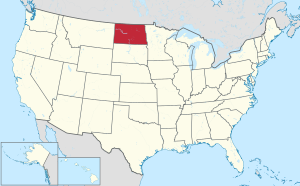Cass County, North Dakota: Difference between revisions
mNo edit summary |
mNo edit summary |
||
| Line 23: | Line 23: | ||
Cass County dates back to the days of the [[Dakota Territory]]. It was one of the original counties defined in [[1872]], and was organized on [[October 27]], [[1873]], at a meeting in Fargo. It is named in honor of a railroad executive [[George Washington Cass]]. |
Cass County dates back to the days of the [[Dakota Territory]]. It was one of the original counties defined in [[1872]], and was organized on [[October 27]], [[1873]], at a meeting in Fargo. It is named in honor of a railroad executive [[George Washington Cass]]. |
||
== |
==Government== |
||
{| class="wikitable" |
{| class="wikitable" |
||
Revision as of 09:49, 25 May 2009
Cass County | |
|---|---|
 Location within the U.S. state of North Dakota | |
 North Dakota's location within the U.S. | |
| Coordinates: 46°56′N 97°15′W / 46.93°N 97.25°W | |
| Country | |
| State | |
| Founded | 1872 |
| Seat | Fargo |
| Largest city | Fargo |
| Area | |
| • Total | 1,768 sq mi (4,580 km2) |
| • Land | 1,765 sq mi (4,570 km2) |
| • Water | 3 sq mi (8 km2) 0.15% |
| Population (2000) | |
| • Total | 123,138 |
| • Density | 70/sq mi (27/km2) |
| Website | www |
Cass County is a county located in the state of North Dakota, USA. As of 2000, the population was 123,138. Its county seat is Fargo.Template:GR It is the most populous county in North Dakota.
Cass County is part of the Fargo, ND–MN Metropolitan Statistical Area.
History
Cass County dates back to the days of the Dakota Territory. It was one of the original counties defined in 1872, and was organized on October 27, 1873, at a meeting in Fargo. It is named in honor of a railroad executive George Washington Cass.
Government
| District | Commissioner | In office since | Current term expires in |
|---|---|---|---|
| 1st | Scott Wagner | 2000 | ???? |
| 2nd | Vern Bennett | 2002 | ????? |
| 3rd | Ken Pawluk | 2004 | ???? |
| 4th | Darrell Vanyo (Vice Chairman) | 2002 | ???? |
| 5th | Robyn Sorum | 2000 | ???? |
Geography
According to the U.S. Census Bureau, the county has a total area of 1,768 square miles (4,579 km²), of which, 1,765 square miles (4,572 km²) of it is land and 3 square miles (7 km²) of it (0.15%) is water.
Townships
Major highways
Adjacent counties
- Traill County (north)
- Norman County, Minnesota (northeast)
- Clay County, Minnesota (east)
- Richland County (southeast)
- Ransom County (southwest)
- Barnes County (west)
- Steele County (northwest)
Demographics
As of the censusTemplate:GR of 2000, there were 123,138 people, 51,315 households, and 29,814 families residing in the county. The population density was 70 people per square mile (27/km²). There were 53,790 housing units at an average density of 30 per square mile (12/km²). The racial makeup of the county was 95.10% White, 0.81% Black or African American, 1.08% Native American, 1.26% Asian, 0.03% Pacific Islander, 0.43% from other races, and 1.29% from two or more races. 1.23% of the population were Hispanic or Latino of any race. 34.1% were of German and 32.4% Norwegian ancestry according to Census 2000.
There were 51,315 households out of which 29.9% had children under the age of 18 living with them, 47.3% were married couples living together, 7.6% had a female householder with no husband present, and 41.9% were non-families. 31.2% of all households were made up of individuals and 7.6% had someone living alone who was 65 years of age or older. The average household size was 2.32 and the average family size was 2.98.
In the county the population was spread out with 23.4% under the age of 18, 16.0% from 18 to 24, 31.3% from 25 to 44, 19.6% from 45 to 64, and 9.7% who were 65 years of age or older. The median age was 31 years. For every 100 females there were 100.3 males. For every 100 females age 18 and over, there were 99.5 males.
The median income for a household in the county was $38,147, and the median income for a family was $51,469. Males had a median income of $32,216 versus $22,300 for females. The per capita income for the county was $20,889. About 5.7% of families and 10.1% of the population were below the poverty line, including 9.1% of those under age 18 and 8.1% of those age 65 or over.
Population by decade

Places

Cities
Note: all incorporated communities in North Dakota are called "cities" regardless of their size.




